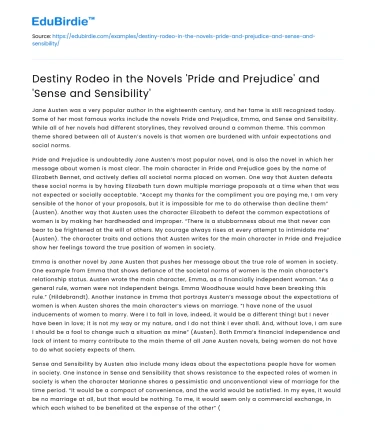Jane Austen was a very popular author in the eighteenth century, and her fame is still recognized today. Some of her most famous works include the novels Pride and Prejudice, Emma, and Sense and Sensibility. While all of her novels had different storylines, they revolved around a common theme. This common theme shared between all of Austen’s novels is that women are burdened with unfair expectations and social norms.
Pride and Prejudice is undoubtedly Jane Austen’s most popular novel, and is also the novel in which her message about women is most clear. The main character in Pride and Prejudice goes by the name of Elizabeth Bennet, and actively defies all societal norms placed on women. One way that Austen defeats these social norms is by having Elizabeth turn down multiple marriage proposals at a time when that was not expected or socially acceptable. “Accept my thanks for the compliment you are paying me, I am very sensible of the honor of your proposals, but it is impossible for me to do otherwise than decline them” (Austen). Another way that Austen uses the character Elizabeth to defeat the common expectations of women is by making her hardheaded and improper. “There is a stubbornness about me that never can bear to be frightened at the will of others. My courage always rises at every attempt to intimidate me” (Austen). The character traits and actions that Austen writes for the main character in Pride and Prejudice show her feelings toward the true position of women in society.
Save your time!
We can take care of your essay
- Proper editing and formatting
- Free revision, title page, and bibliography
- Flexible prices and money-back guarantee
Emma is another novel by Jane Austen that pushes her message about the true role of women in society. One example from Emma that shows defiance of the societal norms of women is the main character’s relationship status. Austen wrote the main character, Emma, as a financially independent woman. “As a general rule, women were not independent beings. Emma Woodhouse would have been breaking this rule.” (Hildebrandt). Another instance in Emma that portrays Austen’s message about the expectations of women is when Austen shares the main character’s views on marriage. “I have none of the usual inducements of women to marry. Were I to fall in love, indeed, it would be a different thing! but I never have been in love; it is not my way or my nature, and I do not think I ever shall. And, without love, I am sure I should be a fool to change such a situation as mine” (Austen). Both Emma’s financial independence and lack of intent to marry contribute to the main theme of all Jane Austen novels, being women do not have to do what society expects of them.
Sense and Sensibility by Austen also include many ideas about the expectations people have for women in society. One instance in Sense and Sensibility that shows resistance to the expected roles of women in society is when the character Marianne shares a pessimistic and unconventional view of marriage for the time period. “It would be a compact of convenience, and the world would be satisfied. In my eyes, it would be no marriage at all, but that would be nothing. To me, it would seem only a commercial exchange, in which each wished to be benefited at the expense of the other” (Austen). Another example of Austen using her writing in Sense and Sensibility to highlight the unfair treatment of women due to societal norms is the entailment situation regarding the Dashwood family. “In Sense, after his death, Mr. Henry Dashwood, left his second wife, Mrs. Dashwood, and her three daughters, Elinor, Marianne, and Margaret, with no home and very little income, only 500 pounds, to accommodate their lives. Instead of offering equal inheritance to his wife and daughters, Mr. Dashwood’s money goes to his only son, John, from a previous marriage” (Abdullhaq). By expressing unorthodox views on marriage and unfortunate situations caused by entailment laws, Austen sends the reader a clear message about the unfair prejudice against women due to social norms and expectations.
In all of her novels, Jane Austen sends the reader a message about her views of the unfair burden placed on women by society. Austen uses the actions of her characters and their words to get her point across to the reader. Throughout the novels Pride and Prejudice, Emma, and Sense and Sensibility, Austen alludes to her belief in the place that women hold in the population. She sends the message to the reader that just because women have an expected role in society, they do not have to meet the expectations of that role.






 Stuck on your essay?
Stuck on your essay?

